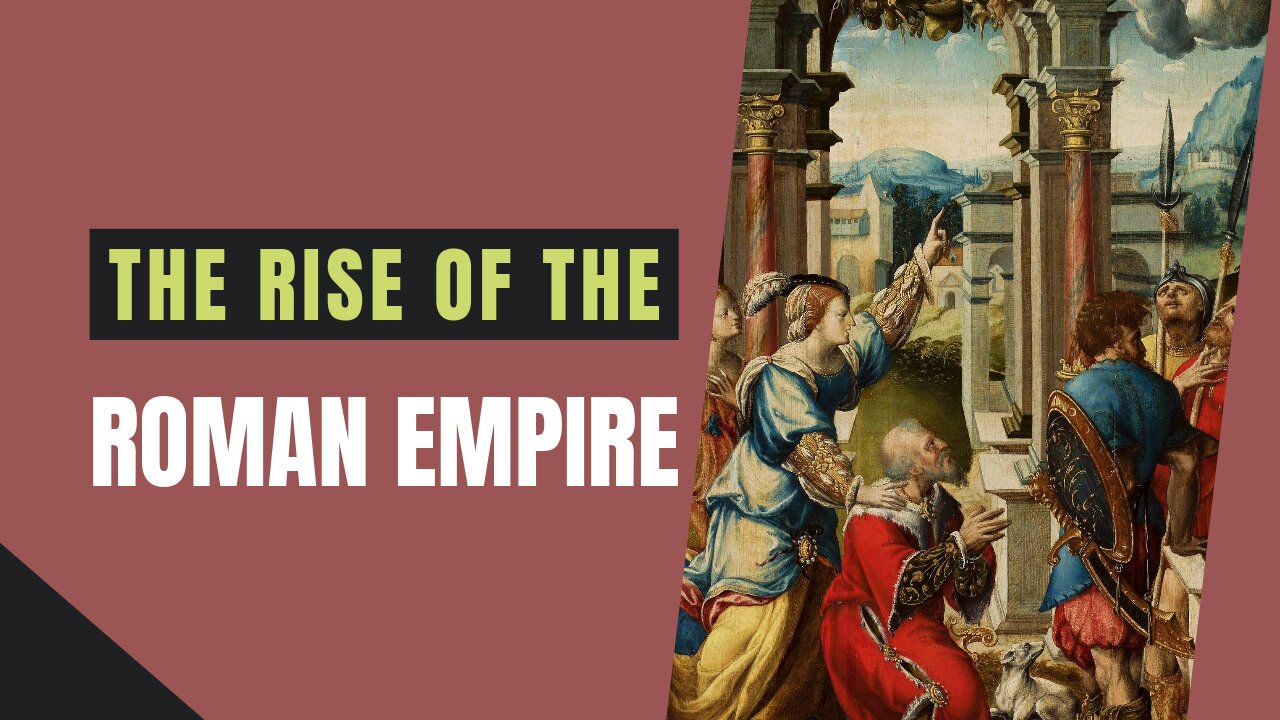Premium Only Content

The Early Years of the Roman Empire: From Republic to Imperial Power
The early days of the Roman Empire represent a crucial era when the Roman Republic evolved into a formidable imperial force. This left an enduring mark on Western civilization, deeply impacting politics, legal systems, culture, and more.
The Roman Empire was founded in Rome in 753 BC by the twin brothers Romulus and Remus. The strategic location along the Tiber River, provided access to fertile lands, natural defenses, and crucial trade routes, all of which played a pivotal role in its rise.
Rome's evolution from a monarchy to a republic in 509 BC marked a significant turning point, introducing a novel system of governance, characterized by a delicate balance of power among various branches. This fostered political stability and accountability.
One of the key factors in Rome's ascent was its formidable military. The Roman legions, known for their discipline and organization, became the backbone of the empire's expansion.
Rome's republic held annual elections of two consuls, who served as both political leaders and military commanders. However, the political landscape was marked by a struggle between the patricians and the plebeians.
During the early republic, Rome experienced significant territorial expansion, including the conquest of the Italian peninsula and the epic conflicts known as the Punic Wars against Carthage.
The rise of Julius Caesar in the first century BC marked a pivotal moment in Roman history. His remarkable career as a skilled military general and charismatic politician began to ascend when he formed the First Triumvirate in 60 BC, amid political turmoil and power struggles. This informal alliance enabled Caesar to secure the consulship and embark on successful military campaigns in Gaul.
As consul, Julius Caesar implemented a series of reforms aimed at addressing social and economic inequalities. Nevertheless, his ambition and popularity made him a polarizing figure within the Roman Senate, leading to a power struggle. In 49 BC, Caesar famously crossed the Rubicon River with his legions, sparking a civil war against the Senate and his rival, Pompey.
In 48 BC, Caesar emerged victorious at the Battle of Pharsalus, compelling Pompey to flee to Egypt, where he met his demise.
Caesar returned to Rome as a conquering hero. He assumed the position of dictator perpetuo, effectively making him the supreme ruler of Rome, and enacted a series of reforms. However, Caesar's growing power and refusal to disband his legions raised concerns among the Senate and traditionalists who feared a return to monarchy.
On the Ides of March in 44 BC, Caesar was assassinated by a group of Senator conspirators led by Brutus and Cassius, plunging Rome into turmoil once again.
Eventually, the Second Triumvirate was formed in 43 BC. Comprising Octavian (Caesar's great nephew and heir), Antony, and Lepidus, this sought to avenge Caesar's death and consolidate their authority.
The Second Triumvirate purged political opponents, and pursued Caesar's assassins, most notably Brutus and Cassius, who were defeated at the Battle of Philippi in 42 BC. However, personal rivalries and power struggles within the triumvirate led to the marginalization of Lepidus. Tensions between Octavian and Antony grew, culminating in the famous Battle of Actium in 31 BC, where Octavian emerged victorious.
Octavian became the uncontested ruler of Rome. In 27 BC, he formally established the principate. Augustus, as Octavian came to be known, portrayed himself as the princeps, or "first citizen," rather than a monarch.
Augustus wielded enormous power. He held multiple titles, including imperator (military commander), consul, and tribune, which granted him authority over the military, administration, and the Roman Senate. This period marked the beginning of the Roman Empire in earnest.
Augustus oversaw an era of relative peace and stability known as the Pax Romana, that lasted until 180 AD. This period witnessed remarkable prosperity and cultural flourishing. The Roman Empire reached its zenith, spanning from Britannia to Egypt.
Augustus ruled for over four decades, and his succession plan paved the way for a line of emperors known as the Julio-Claudian dynasty. This dynastic succession solidified the principle of hereditary rule, which persisted in subsequent imperial dynasties.
The early years of the Roman Empire left an indelible impact on world history. The transition from the Roman Republic to the Roman Empire marked the end of a republican experiment and the rise of a new political order characterized by autocracy and centralization.
Photo credits - Jebulon, Chris Nas, Joel Bellviure, José Luiz Bernardes Ribeiro, FeaturedPics, Diliff, Doc Searls, Benh LIEU SONG, Marcok, Kurt Kaiser, Vyacheslav Argenberg, Herbert Weber, Jenna Post, Krzysztof Golik, Shakko, Rabax63, Alphanidon, Luke Jones, Pveverdingen, Carole Raddato @ wiki commons
Music - Trumpets in Your Ears by Wowa & Chris Rede, Please Wait by Wowa @unminus.com
-
 5:13
5:13
Members Club
4 hours agoProposal Fails You Won’t Believe 💍😂
25 -
 LIVE
LIVE
SportsPicks
2 hours agoCrick's Corner: Episode 66
41 watching -
 29:09
29:09
The White House
3 hours agoPresident Trump Participates in a Bilateral Meeting with the President of Ukraine
11.6K41 -
 1:47:30
1:47:30
Tucker Carlson
3 hours agoAuron MacIntyre: The American Empire Is Racing Towards Collapse. Here’s How to Prevent It.
42.4K53 -
 1:04:35
1:04:35
Mark Kaye
3 hours ago🔴 Trump and Zelenskyy Plan Oval Office Rematch!
7.12K2 -
 1:04:36
1:04:36
Sean Unpaved
2 hours agoBehind the Snap: Unpacking Giants' QB, Saints & Browns Battles, Caleb's Climb, & Cowboys' Plan B
17.2K -
 LIVE
LIVE
Barry Cunningham
6 hours agoBREAKING NEWS: PRESIDENT TRUMP MEETS WITH ZELENSKY AND OTHER WORLD LEADERS!
2,411 watching -
 LIVE
LIVE
StoneMountain64
2 hours agoBattlefield 6 Roundup, and NEW MAP for Battlefield 2042 on the Road to BF6
66 watching -
 LIVE
LIVE
Nerdrotic
5 hours ago $2.00 earnedSuperman GUNNED DOWN | Marvel Phase SUX - Nerdrotic Birthday Nooner 508
620 watching -
 18:52
18:52
Neil McCoy-Ward
2 hours agoBrace Yourself… They’re Coming for Everything You’ve Got!
6.88K8